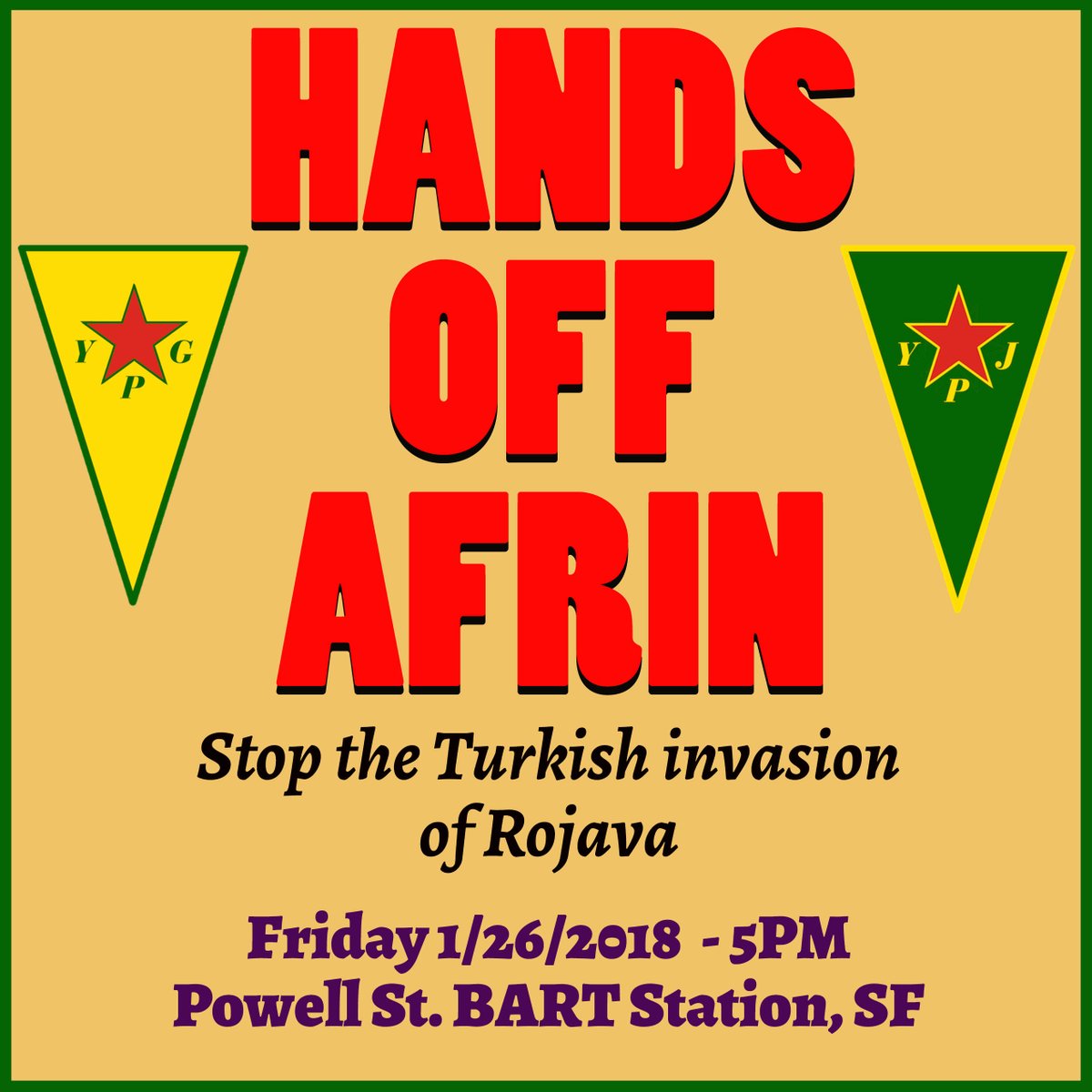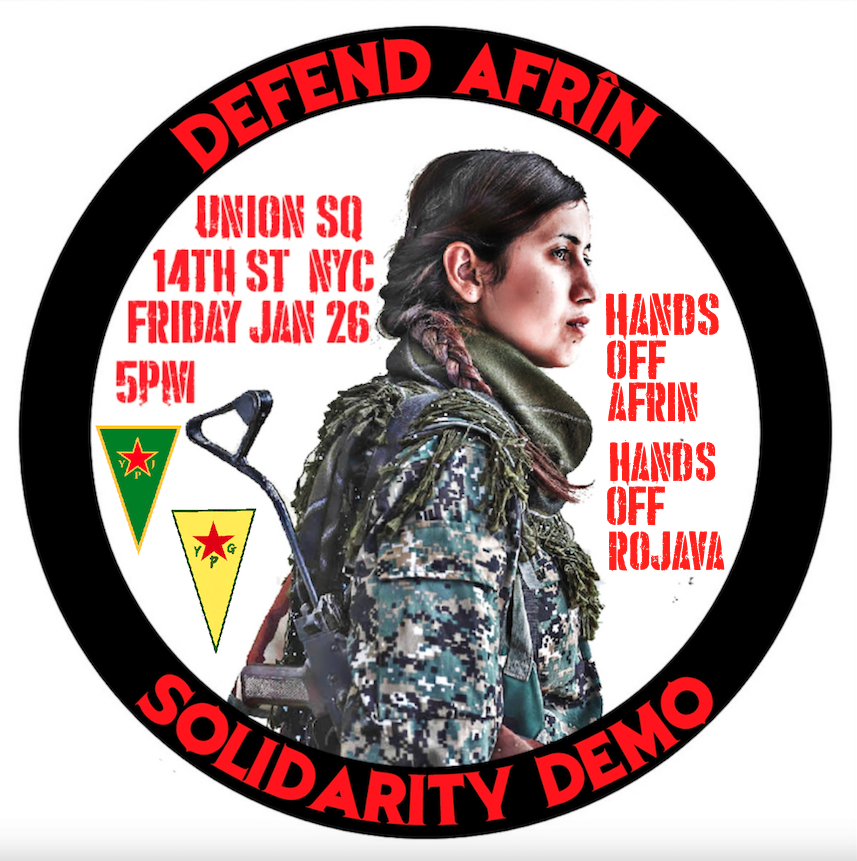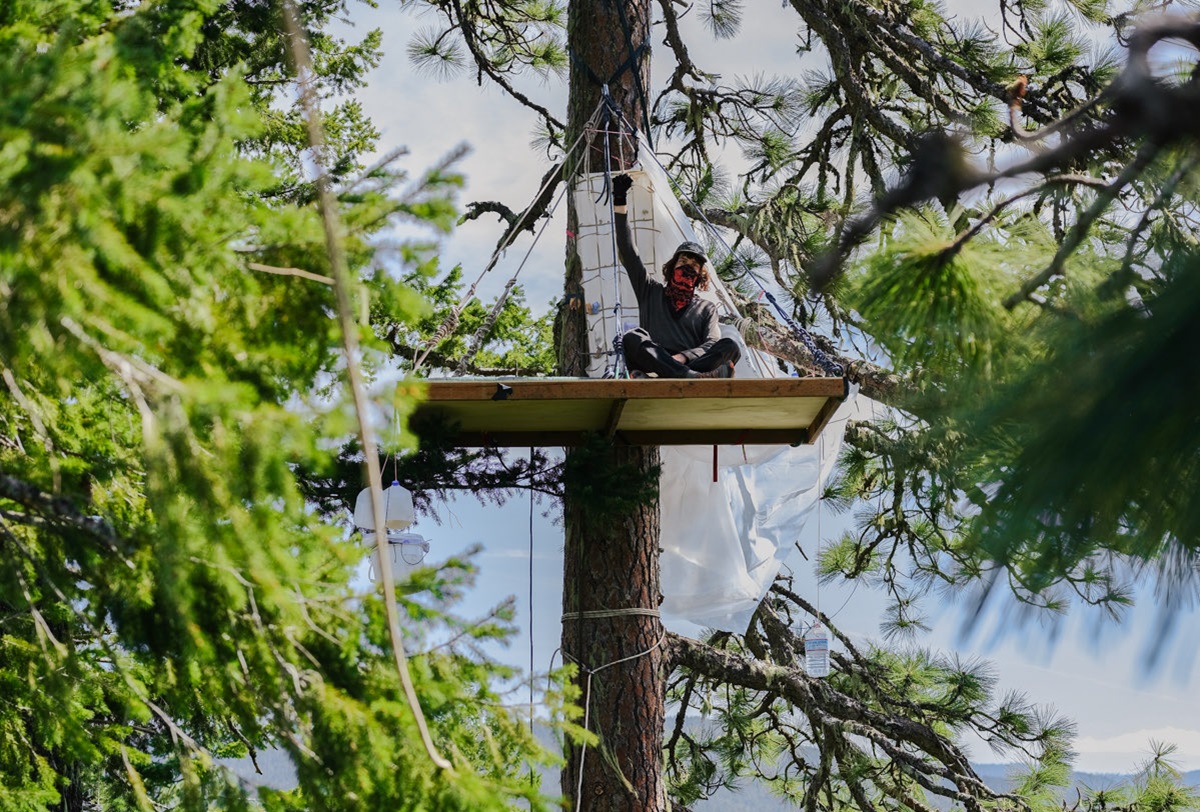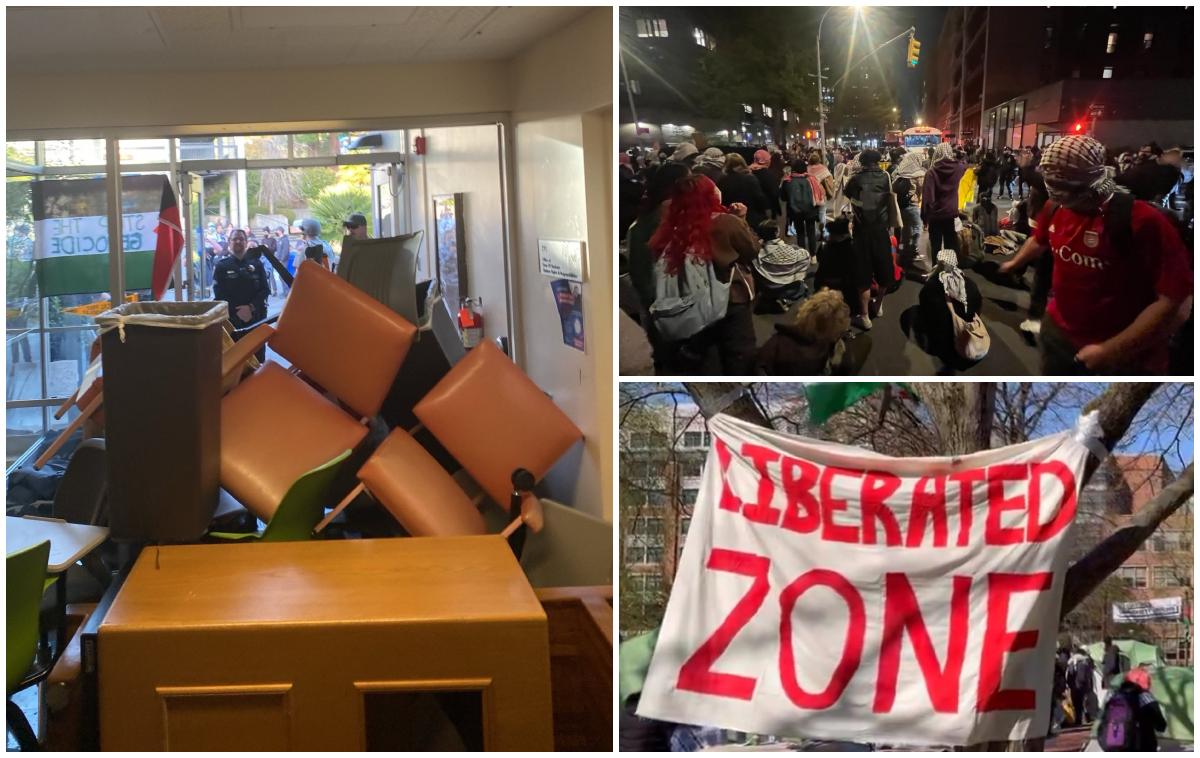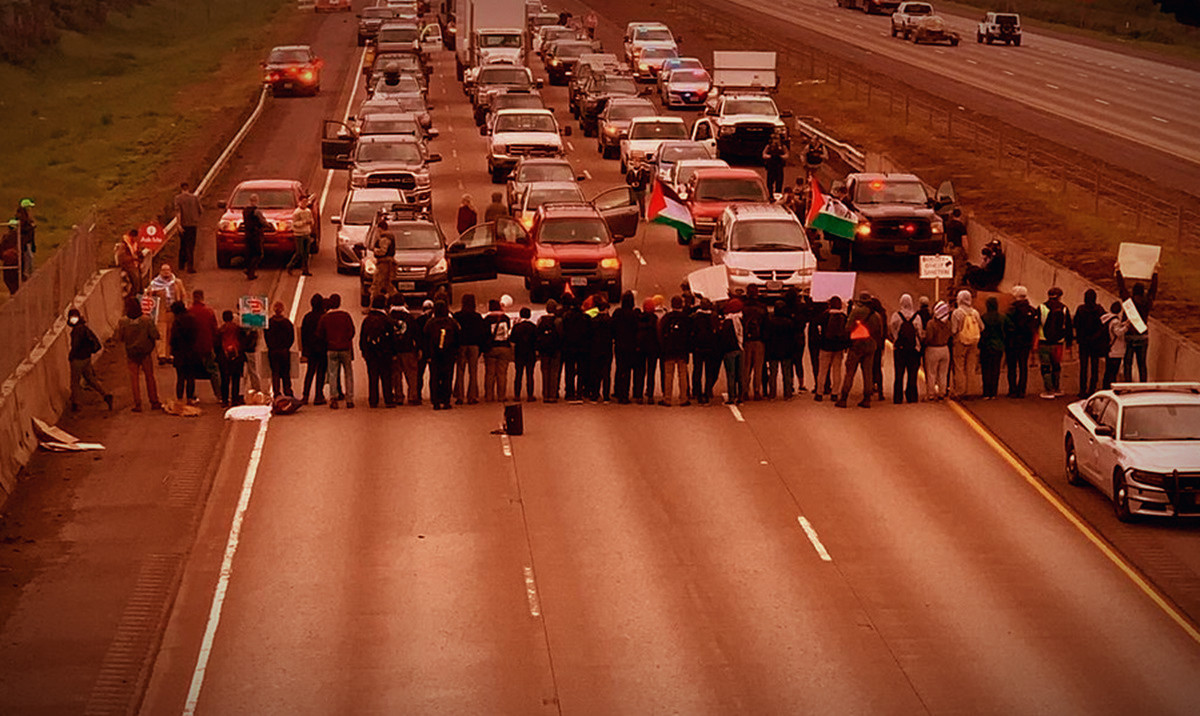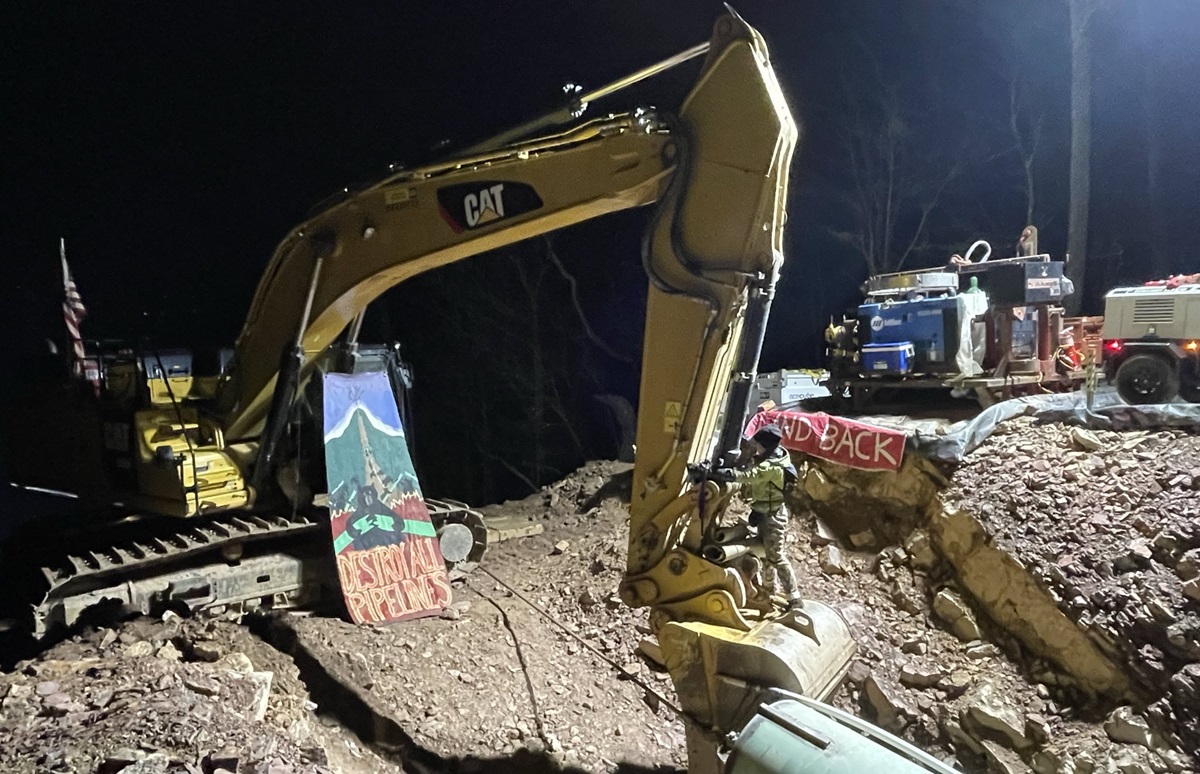Filed under: Featured, International Coverage

At It’s Going Down, we try and task ourselves with covering autonomous social movements and struggles within so-called North America. However, we are internationalists and support struggles for autonomy and freedom and against capital, the State, industrialism, and colonialism across the world.
With that in mind, we have created this list of texts from a variety of English language sources about developing struggles and revolts in Rojava, Tunisia, and Iran, due to their increase in intensity in the last two months. For more updates, be sure to check Insurrection News, Dialectical Delinquents, Anarkismo, and LibCom.
While this collection is by no means extensive and we can’t cover everything, we do hope this list will help anarchists and autonomists in North America deepen our affinities with those struggling across the world, as well as recognize the role that “our” governments, corporations, and policing agencies have in exporting and maintaining systems of domination, control, and exploitation. Also, for those looking for demonstrations in solidarity with Afrin, check the list below. Click on the title for each of the following selections to read the entire text.
Turkish Invasion of Rojava
For the last several years, anarchists, anti-capitalists, and many people on the Left have been supporting the ongoing struggle and evolving movement in Rojava, as an autonomous region in Kurdistan began to take shape, taking up parts of Turkey, Syria, and Iraq. There, a shift has taken place in the form of growing support for “Democratic Confederalism,” which embraces many aspect of anarchism, ecology, and feminism, as well as in the fierce resistance by the YPG and the YPJ against ISIS. In the battle against the Islamic State, many anarchists and anti-capitalists have also joined in the struggle and given their lives. However, after the fall of ISIS in Raqqa, the Turkish state quickly moved to attack the Kurdish forces, and began a campaign of bombing and attacking various cities starting with Afrin.
Does this mean the death of the Rojava Revolution, and with it, a hope of an anti-capitalist and anti-Statist way of life? Will our comrades in the YPG and YPJ, as well as our anarchist sisters and brothers be slaughtered? How can we act in solidarity with those on the ground? These are hard questions of which we do not have answers, but already people across the US are rallying in support of the Kurdish struggle for autonomy and freedom.
Here is #Kobane where thousands took streets to show solidarity with #Afrin pic.twitter.com/8OGRrk6BO8
— Mutlu Civiroglu (@mutludc) January 19, 2018
Rojava: Urgent Message from an Anarchist Comrade in Afrin
Comrades, we need your help more than everything. Its a life or death situation. This invasion isnt only about Afrin nor Rojava/Assyria/N. Syria but Erdogan wants to invade also the whole border territory, including Iraq’s Ezidistan (Zoroaster Kurdish lands /Sinjar), Ninewah (Iraqi Assyria), Turkmeneli (Iraqi Shia Turkomans) and Iraqi Kurdistan’s Qandil mountains area (PKK’s HQ and dissidents and oppressed people’s refugee villages and camps). Its clearly IMPERIALISM and he wants to destroy everything and massacre every people he just hate.
Another important thing is Turkish and Bakur (Turkish Kurdistan) Kurdish comrades situation. Before the invasion, Erdogan first invaded Turkish Kurdistan and Eastern Turkey to eliminate PKK and her Turkish Marxists allies. Not only guerrillas but also autonomous municipalities were invaded. Erdogan and his fake opposition (Kemalists and Nationalists) are all fascists, they even arrested members of parliament from HDP (pro-Kurdish and Turkish Marxist alliance, 3rd biggest party in parliament). Our comrades in Turkey and Turkish Kurdistan are in HELL.
In Western Turkey (İstanbul, Ankara, Smyrna regions) anarchists are suffering. We even lost contact with lots of groups. For example there has not been any statement from DAF (Revolutionary Anarchist Movement) nor Kara-Kızıl (Black-Red). Comrades from Kara Bayrak Otonomu (Autonomous Black Flag) are missing (possibly arrested without legal process). All HDP coalition and anarchists of Turkey paying the “heaviest price” after Afrin.
We need your help. This war is chaotic already and our military power is decreasing day by day, we need to protect our comrades (and their families!) from Erdogan’s revenge and torture dungeons. Without international support, he will kill us one by one. Please make something. We are dying. Please hear us.
Statement from Revolutionary Anarchist Action (DAF) about the Turkish State Attacks Against Afrin, Rojava
The attack on Afrin, It is a strategy of the Energy War that resulted in breakdown of Syria and that will break down many states in the region. States create the illusion that they are doing these wars “for their citizens”. They make nationalist conservative propaganda to convince their citizens of this misconception. This is an inescapable need both inside and outside. While it is required for the elections inside, it is valid on the tables outside. Rulers who go through a completely commercial process such as the extraction, transport, and sale of energy resources use all their materials to increase their gains. In these discussions where the numbers of rifles, tanks, airplanes are important, the number of soldiers is the most important number. A soldier is no different than a material. This is why the nationalist conservative fallacy is created.
Who would join a war so that some gain more? Who would fight for gasoline which is always sold by states or companies everywhere, a drop of it costs more than bread? We, the ones who live with the fact that all prices go up when the price of a liter of gasoline goes up, we who always loose, why should we always fight for the ones who always win? Actually nobody would fight for them. They know this fact and this is why they need nationalism, conservatism.
Now they are are shouting from newspapers and televisions, the slogans of fallacy “national, national, national!”, “National will, national unity”. They can never say clearly; “We are pinching pennies,” “Fight or fight, we will sell the gasoline and everything to you. We will make you produce it, we will make you consume it, and we will exploit you. ” This is the plan, program, strategy, war of the states. We peoples – those who are compulsory citizens of the states – can change everything. Today, the people of Afrin live freely because they changed it. As in Kobanê, Cizére, Chipas. And this is the critical difference between the war of the people and the war of the states. In its war, state attacks and attacks without rules so that it’s system gains more. Bombs with tanks and airplanes. Wounds, kills, murders and wants all life captivated. As for the war of the peoples, there is freedom.
For the last two days, each bomb dropped on Afrin, each bullet is a bullet to freedom. Turkish state which wants to increase its share on the table, has started the Afrin attack. It is a strategy created by nationalism and conservatism which is based on this fallacy. It’s all election strategy. It is completely a commercial strategy. The war of the state is a strategy. But the war of the peoples is freedom. And no state can defeat peoples fighting for freedom.
Solidarity with #Afrin!
Demos in #NYC #DC #Boston#AfrinWillBeTheGraveyardOfFascism#DefendAfrin pic.twitter.com/j76uo7nuHS— RojavaSolidarityNYC (@RojavaNyc) January 22, 2018
A call for solidarity: defend Afrin — defend humanity!
The United States, meanwhile, which conveniently used the Kurds as “reliable boots on the ground” in Syria for the last years in the international anti-ISIS coalition, stays quiet over their NATO ally’s ambitions to sacrifice the heroes of the ISIS war, merely warning Turkey to “avoid civilian casualties.” European governments, especially Germany, have their own stakes in the game, as mostly European weapons and tanks are used by the Turkish army; weapons in the hands of fascists, which drive millions of people to leave their homes and risk death to become refugees in Europe.
Seven years into the war, Syria is destroyed; ISIS came, killed and left; genocide and massacres have been committed; the region’s demography and ecology have changed; Assad seems to be here to stay. The legitimate demands of all Syrians who took to the streets and risked their lives to call for dignity, freedom and justice against the Assad regime have been betrayed bitterly. Meanwhile, the powerful state actors in the region and beyond seem to have come full circle, as more than half a million people died and around 6 million have been displaced. Activists speak of the Third World War taking place in this region.
It is within this context that Turkey launches its war on Afrin, far exceeding the historical hostility of the Turkish state towards the Kurdish people. The battle symbolizes the two options that the peoples and communities of the Middle East face today: between militarist, patriarchal, fascist dictatorships on the one hand, controlled by foreign imperialist interests and capital, or the solidarity between autonomous, self-determined, free and equal communities on the other. The defense of Afrin is an opportunity for the left to unite against fascism and mobilize against militarism, occupation and war.
✊? Raqqa, the city liberated by Kurdish militas from ISIS, comes out in solidarity with Afrin (bombed by the Turkish army). – #AfrinUnderAttack
Via @aminahekmet pic.twitter.com/UkyZcgCt64
— Xavi Ruiz (@xruiztru) January 25, 2018
Worldwide: Hands Off Afrin!
With such a call, obviously not everyone can be expected to drop everything and rush off to Kurdistan. But in truth people can help wherever they are from, in a most concrete and practical way. Thus, we call for immediate demonstrations at Turkish embassies and practical and continued actions against symbols of the Turkish state, large Turkish business interests and multinationals, as soon as practically possible- from all those feeling the urge to respond, for all those who want to make revolutionary international solidarity a practical reality. This will help to make more concrete the international links of solidarity that already exist with the Kurdish freedom struggle, and bring them into the field at a critical moment.
Finally we would like to make a special call to the famous activists of Anonymous, as this vibrant network of resistance has been maturing and growing rapidly by leaps and bounds, recently intervening with well-targeted actions on the side of struggles in Catalonia and Greece (to say nothing of prior actions during the Arab Spring). Our proposal is this: let’s make Afrin the most real and profound test-case for the increasing coordination and coherence of this volunteer global cyber-militia, digital freedom fighters who act as an invaluable ‘worldwide artillery’ support for regions fighting for their independence! Turkish telecoms and internet service providers, banks, governmental websites, the petroleum industry, power grids, airlines, etc.&c (you all know best)- all are targets for economic disruption, to act behind enemy lines and offer material support to Afrin, encircled, bombarded and fighting for its very life. These actions, with perseverance and concentrated, sustained effort, will work to bankrupt the (already malfunctioning and unstable) Erdogan war machine, and rouse the embers of resistance amongst the Turkish population itself.
As was said in the workers’ movement: an injury to one is an injury to all–and so too, a victory for Afrin is a victory for all of us, a blow struck for freedom against military despotism and tyranny!
Statement in Solidarity with Afrin and the Rojava Revolution
The people of Afrin are facing the violence of a Turkish state bent on the ethnic cleansing of the Afrin Canton. Turkey, the second largest army in NATO, has started a ground invasion supported by airstrikes on civilian targets. The people of Afrin, 400,000 in total, are being abandoned by their international partners. We support Rojava and the revolution against Turkey’s fascist, racist, neo-imperial politics against the Kurds, Arabs, Assyrians, Ezidis and other ethnic and religious minorities who are building peace and a radically democratic society from the ground up.
Solidarity Demonstrations with Afrin
Friday, Jan 26th, San Francisco, CA
Friday, Jan 26th, Nashville, TN
Friday, Jan 26th, New York City, NY
Saturday, Jan 27th, Los Angeles, CA
Saturday, Jan 27th, Boston, MA
Sunday, Jan 28th, Knoxville, TN
Popular Uprising in Iran
When Iran exploded, people on the Right and in the Center mainly dismissed the revolts, clashes with the authorities, and riots as the work of the “Deep State,” or outside forces, however the uprising took on a very clear class quality to it, in response to neoliberal policies. The State has responded not only with repression, but also by shutting off access to the internet, stalling one attempt at a general strike.
In a "first" for #IranProtests, demonstrators chant "Death to Revolutionary Guards!" in city of Rasht pic.twitter.com/cLyq9stz4H
— Josh Caplan (@joshdcaplan) December 30, 2017
Solidarity with the Popular Protests in Iran
Since December 28, 2017, the Islamic Republic of Iran has been shaken by a wave of social protests unprecedented since the 2009 Green Movement. The protests first erupted in Mashhad, a holy city and Iran’s second largest city near the northeastern border. Protesters opposed the rise in prices of basic goods and increasing poverty, chanted “death to Rouhani”, “death to the dictator [Ayatollah Khamenei]” and called for an end to Iran’s military intervention in Syria and Lebanon. Protests quickly spread to more than 100 cities and villages throughout Iran, including the capital city of Tehran.
So far, at least 22 individuals have been killed (3 in detention) and the violent security forces have arrested more than 3700 persons including 1000 in the southern city of Ahvaz, and many women who have been actively involved in the protests. Iran’s authoritarian regime has also blocked access to Telegram and Instagram instant messaging, which are heavily used, and has limited access to the internet by creating interferences. At least 100 student activists, especially leftists and progressives, have been arrested and some have been released. Security forces have surrounded and in some cases invaded university campuses. Other students and labor activists are being hunted and kidnapped from their homes and dorms. Those captured may well face torture.
The Iranian regime, similar to other authoritarian regimes of the region, has accused the protesters of being part of an international conspiracy led by the USA, Saudi Arabia and Israel.
The protests are rooted in socio-economic problems, notably poverty, unemployment, and political repression, lack of democratic freedoms such as freedom of speech and assembly. Furthermore, discrimination against women and national and religious minorities is intensifying opposition in an ethnically diverse population that has an 87% literacy rate and is connected to the world through the internet. 40% of the population lives under the relative poverty line and 90% of Iran’s workers are contract workers without any rights and benefits. The minimum wage of $230 per month, which is one fifth of what is needed to support a family of four, is not even enforced. Many Subsidies for basic food items and essential services were abolished between 2010 and 2014, during the presidencies of Mahmoud Ahamadinejad and Hassan Rouhani. At the same time the prices of basic foodstuffs are exploding. The share of healthcare in the budget has been slashed. Energy prices are going up. All this, combined with rising general inflation (12% according to the regime and 40% in fact) is a new blow to the purchasing power of workers and the poorest segments of society.
https://www.youtube.com/watch?time_continue=3&v=sqEJ_cB9-Aw
Iran: The Working Class Raises Its Head
After the “moderate” cleric Hassan Rouhani was re-elected in the Iranian presidential elections of 2017 his regime which had been pushing neo-liberal ideas continued on the same course. The public health service has been slashed so much it hardly exists, and job and workplace security have gone. Many jobs are now precarious (short-term contracts etc.) whilst the professionals-doctors, technicians, etc. have seen their living standards pushed down drastically. Whilst the capital Teheran has been allowed to grow, many regional cities and towns have seen conditions deteriorate, and the same goes for provision to the various ethnic groups within Iran.
Many people have been forced to cut back drastically on foodstuffs they had previously considered as essential (dairy and meat products). Unemployment is rampant. There is a whole swathe of young people born in the 1980s, many of whom are college and university graduates who have not been able to get jobs, or if they have are earning very low wages. Unemployment runs at 40% or more among young people.
The past year has seen a number of low-key and little reported demonstrations, rallies and sit-ins. These include bus drivers supporting their independent organisations, pensioners protesting against increasing attacks on their allowances, teachers and nurses protesting against their conditions, and students opposing the privatisation of education.
Rouhani pushed a new plan for unpaid internships which was strongly opposed by students. A leading activist among the bus drivers was imprisoned and treated appallingly.
This situation was aggravated by the earthquake of November 12th. Those who survived were treated contemptuously by officials which brought a wave of widespread disgust amongst the Iranian population. This was further aggravated by the annual budget announcement of the Rouhani regime. Damage from the earthquakes ran at $600 million but the government failed to provide a reconstruction programme, leaving this up to donations from individuals! On the other hand various propaganda bodies of the regime received a budget of $15. Fuel prices were increased by 50%. No funds were provided for state construction programmes.
Iranian Uprising Day by Day Chronology by Dialectical Delinquents
Revolt in Tunisia
As Iran lit up, so too did Tunisia, against many of the same economic and political realities. Is a Arab Proletarian Spring on the horizon?
Tunisia: Power belongs to the street
On Tuesday afternoon, several hundred people, including mums carrying babies, the unemployed and manual labourers, gathered outside the Municipal Theater of Tunis. Brandishing “the people demand the fall of the regime, neither fear nor uncertainty, power belongs to the street”, a mere slogan transformed into a call to action pulsating across the country.
With the popular revolt in its third day, demonstrations have flowered in over 20 cities, including the capital Tunis. The state has captured and arrested over 600 people, but with the seventh anniversary of the 2011 Revolution (and the aspirations it engendered) only three days away, this is unlikely to slow a defiant public.
Alarmingly, the government have deployed the army to several cities across the country, running the risk of killing even more civilians. The one known death so far is Khomsi el-Yerfeni, a 45-year old man from Tebourba, who witnesses say was run over by a security van. A fearless public responded by setting a national security building ablaze in Thala.
Tebourba, the town where Khomsi el-Yerfeni died, is emblematic of the social and economic issues driving the revolt. Thirty kilometres outside the capital, the only two opportunities for work are either gruelling agricultural labour or travelling into the city and spending half your wage on travel; a wage that amounts to USD 160 per month. With youth unemployment as high as 38%, many people aren’t even lucky enough to secure this derisory pay.
Adding insult to injury and perhaps sparking the unrest, the government imposed a series of brutal austerity measures making the cost of living beyond what is possible for most ordinary Tunisians with prices on necessities like gasoline, medicine, housing, internet usage and foodstuff set to rise. Conditions so unfit to live, 400 Tunisians from the country’s mining cities migrated to Algeria as recently as Sunday.
But this isn’t an isolated moment, in the last year there has been a sense that the 2011 Revolution itself was being undermined. The continued cancelling of the municipal elections; the cabinet reshuffle that inserted those with close ties to the former autocrat Ben Ali; and the passing of the economic reconciliation act, overriding the authority of the post-revolution Truth and Dignity Commission.
Tunisia: Violence erupts as police attempt to disperse protest against price hikes
&n … https://t.co/WoaH9Wm6Me#newsfront #USA #news pic.twitter.com/8zC6vpBroz
— NewsFront in English (@ENnewsfront) January 15, 2018
Worldwide: Solidarity with the People of Tunisia!
Friends from all over the world stand in solidarity with the People of Tunisia. We demand that the Tunisian security services immediately release any remaining political prisoners and drop all criminal charges against demonstrators. The Government of Tunisia must respect the People’s right to free expression. The Government of Tunisia must immediately reverse all austerity measures. We, friends from all over the world, will accept nothing less.
Due to pressure from the International Monetary Fund (IMF), the Government of Tunisia has passed tax increases and austerity measures on January 1, 2018. The People of Tunisia have taken to the streets to demand their dignity and to protest this oppression. In response, the Tunisian security services have beaten and tear-gassed the people wishing to exercise their right to free expression. The Tunisian security services have arrested and brought criminal charges against more than 700 people.
On December 17, 2010, Mohamed Bouazizi doused himself in petrol and lit a match. Bouazizi later died from his injuries. Earlier in the morning, a local government official harassed Bouazizi for a bribe. The local government official claimed that selling fruit and vegetables required a permit, which was a lie. Unable to pay the bribe, the local government official had Bouazizi assaulted and had his produce cart confiscated. The people took to the streets to protest the corrupt government and to demand their dignity. On January 14, 2011, the dictator of Tunisia, Ben Ali, fled to the country. In Tunisia, this is known as the Dignity Revolution.


